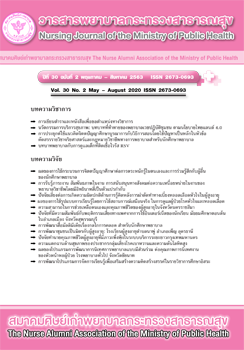Effects of a Simulation-Based Learning Model for Medical Management of Patients with Cardiovascular Diseases
Main Article Content
Abstract
This quasi-experimental research aimed to determine the effects of a simulation-based learning model by examining (1) knowledge before and after the use of the model; (2) students’ critical thinking and self-confidence after using the model; and (3) students’ satisfaction with the use of the model. A total of 36 Advance Emergency Medical Technician (AEMT) sophomores in Academic Year 2019 were included in this study. The study tools composed of (1) a questionnaire of general information, (2) a cardiovascular diseases care test, (3) a critical thinking questionnaire, (4) a self-confidence questionnaire, and (5) a questionnaire of satisfaction with SBL. The resulting data were analyzed using descriptive statistics such as frequency, percentage, and standard deviation. A paired t-test was used to compare two population means. The results showed that, after using the medical simulation-based learning, the post-test mean score for student knowledge was significantly higher than the pre-test mean score (p<.001). Most of the students had high levels of critical thinking (77.78 %) and self-confidence (72.22%). Satisfaction after the students learned by using SBL (80.56%) was at a high level. The results indicated that SBL promoted and enhanced students’ knowledge and practical skills of patient care management. So, SBL might be integrated into the critical thinking program to improve students’ decision-making skills of patient-care management. Further study might be prolonged a period of study to improve students’ patient care management skills consecutively.
Article Details
บทความและรายงานวิจัยในวารสารพยาบาลกระทรวงสาธารณสุข เป็นความคิดเห็นของ ผู้เขียน มิใช่ของคณะผู้จัดทำ และมิใช่ความรับผิดชอบของสมาคมศิษย์เก่าพยาบาลกระทรวงสาธารณสุข ซึ่งสามารถนำไปอ้างอิงได้
References
2. Adib-Hajbaghery M, Sharifi N. Effect of simulation training on the development of nurses and nursing students’ critical thinking: A systematic literature review. Nurse Education Today. 2017;50:17-24.
3. Henneman EA, Cunningham H. Using clinical simulation to teach patient safety in an acute/critical care nursing course. Nurse educator. 2005; 30(4):172-7.
4. Akhu-Zaheya LM, Gharaibeh MK, Alostaz ZM. Effectiveness of simulation on knowledge acquisition, knowledge retention, and self-efficacy of nursing students in Jordan. Clinical Simulation in Nursing. 2013;9(9):e335-e42.
5. Powers K. Bringing simulation to the classroom using an unfolding video patient scenario: A quasi-experimental study to examine student satisfaction, self-confidence, and perceptions of simulation design. Nurse Education Today. 2020;86:104-24.
6. Carvalho DP, Azevedo IC, Cruz GK, Mafra GA, Rego AL, Vitor AF, et al. Strategies used for the promotion of critical thinking in nursing undergraduate education: a systematic review. Nurse education today. 2017;57:103-7.
7. Murray B, Judge D, Morris T, Opsahl A. Interprofessional education: A disaster response simulation activity for military medics, nursing, & paramedic science students. Nurse education in practice. 2019;39:67-72.
8. Kim E. Effect of simulation-based emergency cardiac arrest education on nursing students’ self-efficacy and critical thinking skills: Roleplay versus lecture. Nurse education today. 2018; 61:258-63.
9. Levett-Jones T, Lapkin S. A systematic review of the effectiveness of simulation debriefing in health professional education. Nurse Education Today. 2014; 34(6):e58-e63.
10. Issenberg SB. The scope of simulation-based healthcare education. LWW; 2006.
11. Turatsinze S, Willson A, Sessions H, Cartledge PT. Medical student satisfaction and confidence in simulation-based learning in Rwanda–Pre and post-simulation survey research. African Journal of Emergency Medicine. 2020.
12. Ginzburg SB, Brenner J, Cassara M, Kwiatkowski T, Willey JM. Contextualizing the relevance of basic sciences: small-group simulation with debrief for first-and second-year medical students in an integrated curriculum. Advances in medical education and practice. 2017;8:79.
13. Okuda Y, Quinones J. The use of simulation in the education of emergency care providers for cardiac emergencies. International journal of emergency medicine. 2008;1(2):73-7.
14. Nabzdyk CS, Bittner EA. One (Not So Small) Step for simulation-based competency assessment in critical care. critical care medicine. 2018;46(6):1026-7.
15. Sinthuchai S, Ubolwan K, Boonsin S. Effects of high-fidelity simulation based learning on knowledge, satisfaction, and self-confidence among the fourth year nursing students in comprehensive nursing care practicum. Ramathibodi Nursing Journal. 2017;23(1):113-27. (in Thai).
16. Gaba DM. The future vision of simulation in healthcare. Simulation in Healthcare. 2007; 2(2):126-35.
17. Yeepalo M, Ruangroengkulrit P, Thongjan J, Suwan K, Chaleawsak K. Effects of simulation based learning to enhance critical thinking of nursing students, Boromarajonani College of Nursing Yala. Journal of Nursing, Public Health, and Education (ISSN: 2651-1908 Journal Online). 2017;18(3):128-34. (in Thai).
18. O’Donnell JM, Decker S, Howard V, Levett-Jones T, Miller CW. NLN/Jeffries simulation framework state of the science project: Simulation learning outcomes. Clinical Simulation in Nursing. 2014;10(7):373-82.
19. Cho G-Y. Effects of a simulation-based education on cardiopulmonary emergency care knowledge, critical thinking and problem solving ability in nursing students. Journal of Fisheries and Marine Sciences Education. 2016;28(2):439-49.
20. Hur H-K, Park S-M. Effects of simulation based education, for emergency care of patients with dyspnea, on knowledge and performance confidence of nursing students. The Journal of Korean Academic Society of Nursing Education. 2012;18(1):111-9.

